HOME >> CHINA
Protesters around the world rely on social media to incite anti-government movements
By Zhao Yu Source:Global Times Published: 2019/10/30 20:48:40
○ Social media, which had fueled Arab Spring, now plays a major role in mobilizing youngsters worldwide, organizing them to join anti-government protests
○ Hong Kong becomes the teacher in passing by protest tactics to other places, helping escalate the violence
○ Widespread hateful content on internet needs to be regulated, as social media is not a lawless place
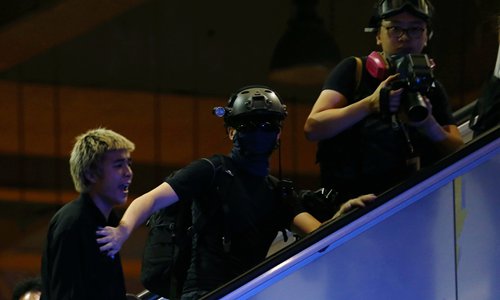
The teenager regularly uses social networks such as Facebook and Telegram, where he and his classmates get updates about protests.
"My friends, my classmates, they all use Telegram. Sometimes, there are videos and messages about Hong Kong protests on it," he said, referring to the popular encrypted messaging app used by demonstrators around the world to organize rallies, which could hide personal information like phone numbers to dodge police.
Video footage showing a black-clad protester fly kicking a Hong Kong police officer has circulated widely on their Telegram chat groups in Catalan, Miquel noted. "I believe there are tactics that Hong Kong protesters teach people here in Catalonia," he added.
From Hong Kong to Lebanon, protesters around the world are relying on social network platforms including Facebook, Twitter, Telegram and Instagram to organize activities, share information, coordinate operations, and even spread hateful messages toward governments and local police.
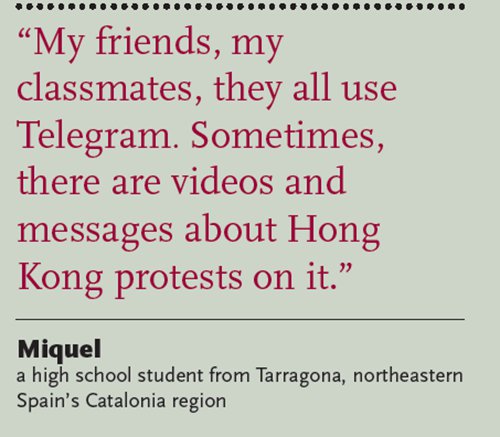
With powerful group chat functions and livestreaming capabilities, some channels that give updates on protests in Hong Kong have over 100,000 subscribers and some in Catalonia have over 200,000.
Protesters who grew up with the internet and social networking apps take advantage of these digital tools that help them locate police on the ground during protests, share so-called intelligence about where to hide and where to attack amid clashes, and even initiate anonymous polls to make decisions.
"Hong Kong is the teacher," David Roman, a Spanish writer who closely observes recent social movements, told the Global Times. As anti-government protests in Catalonia become violent, the radical side of the movement have copied demonstration tactics from their Hong Kong counterparts.
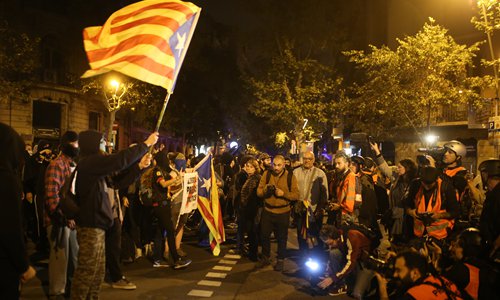
Social media rebellion
Months of protests in Hong Kong have grown increasingly violent, as radical protesters have attacked police officers on the ground with Molotov cocktails, knives, poles, slingshots and other homemade weapons.
On a Telegram group called "Real, Hongkongers' Magic Department," which has at least 10,288 members, there are countless posters and pictures showing how to make Molotov cocktails, block roads, and even how to disrupt traffic by putting nails on the street to puncture tires. Rioters divide themselves into different groups amid clashes with police.
Protesters who belong to the "black magic" are in charge of attacking police officers, covering other retreating protesters, and provoking police with tear gas. Protesters identified as frontline guards post videos, texts, and photos of locations where police are deployed.
Social media allows a movement in one place to take inspiration from revolts in another, said the Financial Times in a recent article.
"Social media like WhatsApp… and local TV stations are also helping demonstrators a lot," a protester in Beirut, capital of Lebanon, told the Global Times.
He said he joined recent anti-government protests in his city and throughout Lebanon, which have been spurred by growing public anger about the government corruption. The social movement began when local authorities planned to tax WhatsApp calls.
On platforms like WhatsApp and Facebook, protesters in Lebanon shared pictures of arson to express their strong dissatisfaction against the government. "At least, everyone can tell his opinion," the protester said, preferring not to be identified.
The increasingly central role of social media in contemporary protest has been reflected on various occasions from G20 demonstrations to the Arab Spring and from the Occupy Movement to Black Lives Matter, according to a research paper published by Dutch researcher Thomas Poell in April.
The intense use of these media is said to change the speed of protest communication, potentially transforming how protests are mobilized, sustained, discussed, represented, and remembered, the paper said.
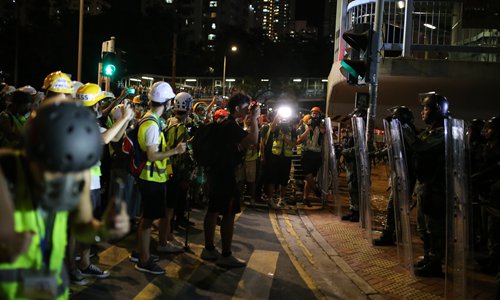
Boundaries needed
As protests continue, more videos and photos suggesting police brutality have been shared in Telegram group chats in Hong Kong, Catalonia and Chile, which have driven young protesters to carry on the fight on the streets.
"We have to fight back as the police treated us in a very cruel way," Miquel said, noting that he received most of protest related information from social media platforms.
In a similar way, there has been a growing hatred toward the police among Hong Kong protesters, as countless videos and photos on Telegram and WhatsApp group chats show police hitting protesters with batons, firing tear gas in residential areas, and pepper spraying arrested protesters.
Such a distorted narrative of Hong Kong's law enforcement has been quickly and widely shared on social media. Some radicals have vowed retaliation and leaked private information of police officers on duty, threatening to hit back and even threaten family members of those officers.
"Social media is a double-edged sword, which indeed needs to be regulated," Qin An, head of the Beijing-based Institute of China Cyberspace Strategy, told the Global Times.
In some countries, opposition groups use social media as a powerful tool of subverting the ruling power by causing ideological division, spreading hatred and inciting violence. "Some may escalate into terror-like acts, which have to be contained at first place," he said.
Some Hong Kong lawmakers have called for shutting down social media platforms like Telegram to curb violence. In an open letter that the outspoken Hong Kong legislator Junius Ho Kwan-yiu sent to Chief Executive of China's Hong Kong Special Administrative Region (HKSAR) Carrie Lam in mid-October, he said social media platforms have gradually become a platform for rioters to communicate and share strategies of committing violent acts.
"Hong Kong is part of China. If Hong Kong social media continues to spread such hate speech against police or teach others how to attack the police, Hong Kong authority could regulate it or shut it down in accordance to the law," Qin said, noting that the country's cyberspace also has to be regulated in line with the law.
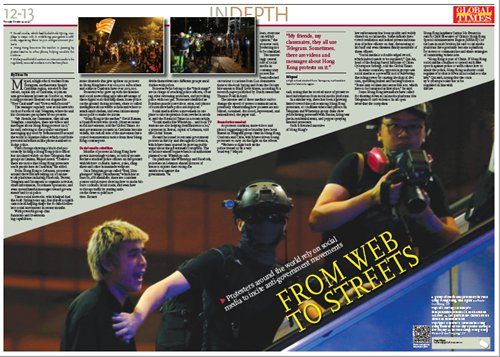
Newspaper headline: From web to streets
○ Hong Kong becomes the teacher in passing by protest tactics to other places, helping escalate the violence
○ Widespread hateful content on internet needs to be regulated, as social media is not a lawless place

A group of black-clad protesters in Yuen Long, Hong Kong, on August 22 Photo: Cui Meng/ GT
Miquel, a high school student from Tarragona, northeastern Spain's Catalonia region, traveled to Barcelona, capital city of Catalonia, to join an anti-government protest on October 21, when young protesters chanted out slogans like "Free Catalonia!" and "Down with fascism!"The teenager regularly uses social networks such as Facebook and Telegram, where he and his classmates get updates about protests.
"My friends, my classmates, they all use Telegram. Sometimes, there are videos and messages about Hong Kong protests on it," he said, referring to the popular encrypted messaging app used by demonstrators around the world to organize rallies, which could hide personal information like phone numbers to dodge police.
Video footage showing a black-clad protester fly kicking a Hong Kong police officer has circulated widely on their Telegram chat groups in Catalan, Miquel noted. "I believe there are tactics that Hong Kong protesters teach people here in Catalonia," he added.
From Hong Kong to Lebanon, protesters around the world are relying on social network platforms including Facebook, Twitter, Telegram and Instagram to organize activities, share information, coordinate operations, and even spread hateful messages toward governments and local police.

These social networks, which helped fuel the Arab Spring years ago, has played a significant role in helping shape the so-called leaderless social movements in recent months.
With powerful group chat functions and livestreaming capabilities, some channels that give updates on protests in Hong Kong have over 100,000 subscribers and some in Catalonia have over 200,000.
Protesters who grew up with the internet and social networking apps take advantage of these digital tools that help them locate police on the ground during protests, share so-called intelligence about where to hide and where to attack amid clashes, and even initiate anonymous polls to make decisions.
"Hong Kong is the teacher," David Roman, a Spanish writer who closely observes recent social movements, told the Global Times. As anti-government protests in Catalonia become violent, the radical side of the movement have copied demonstration tactics from their Hong Kong counterparts.

During Catalan pro-independence protests in Barcelona on October 21, the journalists' cameras were aimed at demonstrators. Photo: Zhao Tingjing/ GT
Social media rebellion
Months of protests in Hong Kong have grown increasingly violent, as radical protesters have attacked police officers on the ground with Molotov cocktails, knives, poles, slingshots and other homemade weapons.
On a Telegram group called "Real, Hongkongers' Magic Department," which has at least 10,288 members, there are countless posters and pictures showing how to make Molotov cocktails, block roads, and even how to disrupt traffic by putting nails on the street to puncture tires. Rioters divide themselves into different groups amid clashes with police.
Protesters who belong to the "black magic" are in charge of attacking police officers, covering other retreating protesters, and provoking police with tear gas. Protesters identified as frontline guards post videos, texts, and photos of locations where police are deployed.
Social media allows a movement in one place to take inspiration from revolts in another, said the Financial Times in a recent article.
"Social media like WhatsApp… and local TV stations are also helping demonstrators a lot," a protester in Beirut, capital of Lebanon, told the Global Times.
He said he joined recent anti-government protests in his city and throughout Lebanon, which have been spurred by growing public anger about the government corruption. The social movement began when local authorities planned to tax WhatsApp calls.
On platforms like WhatsApp and Facebook, protesters in Lebanon shared pictures of arson to express their strong dissatisfaction against the government. "At least, everyone can tell his opinion," the protester said, preferring not to be identified.
The increasingly central role of social media in contemporary protest has been reflected on various occasions from G20 demonstrations to the Arab Spring and from the Occupy Movement to Black Lives Matter, according to a research paper published by Dutch researcher Thomas Poell in April.
The intense use of these media is said to change the speed of protest communication, potentially transforming how protests are mobilized, sustained, discussed, represented, and remembered, the paper said.

Reporters' cameras in Hong Kong focused on the city's police during a riot on July 27 in Yuen Long, Hong Kong. Photo: Zhao Tingjing/ GT
Boundaries needed
As protests continue, more videos and photos suggesting police brutality have been shared in Telegram group chats in Hong Kong, Catalonia and Chile, which have driven young protesters to carry on the fight on the streets.
"We have to fight back as the police treated us in a very cruel way," Miquel said, noting that he received most of protest related information from social media platforms.
In a similar way, there has been a growing hatred toward the police among Hong Kong protesters, as countless videos and photos on Telegram and WhatsApp group chats show police hitting protesters with batons, firing tear gas in residential areas, and pepper spraying arrested protesters.
Such a distorted narrative of Hong Kong's law enforcement has been quickly and widely shared on social media. Some radicals have vowed retaliation and leaked private information of police officers on duty, threatening to hit back and even threaten family members of those officers.
"Social media is a double-edged sword, which indeed needs to be regulated," Qin An, head of the Beijing-based Institute of China Cyberspace Strategy, told the Global Times.
In some countries, opposition groups use social media as a powerful tool of subverting the ruling power by causing ideological division, spreading hatred and inciting violence. "Some may escalate into terror-like acts, which have to be contained at first place," he said.
Some Hong Kong lawmakers have called for shutting down social media platforms like Telegram to curb violence. In an open letter that the outspoken Hong Kong legislator Junius Ho Kwan-yiu sent to Chief Executive of China's Hong Kong Special Administrative Region (HKSAR) Carrie Lam in mid-October, he said social media platforms have gradually become a platform for rioters to communicate and share strategies of committing violent acts.
"Hong Kong is part of China. If Hong Kong social media continues to spread such hate speech against police or teach others how to attack the police, Hong Kong authority could regulate it or shut it down in accordance to the law," Qin said, noting that the country's cyberspace also has to be regulated in line with the law.

Newspaper headline: From web to streets
Posted in: IN-DEPTH